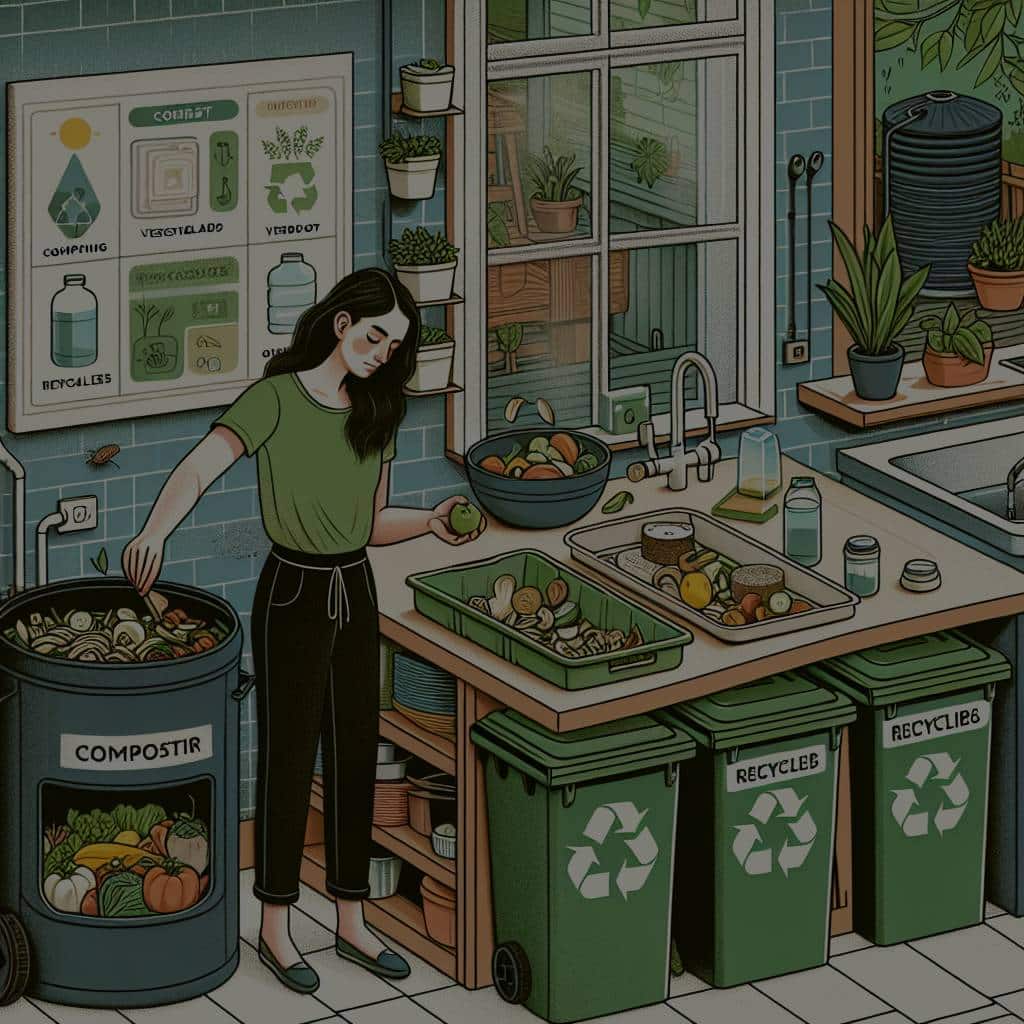What Are the Best Tips for Eco-Friendly Waste Disposal in a Home Kitchen?

The kitchen often acts as the heart of the home, a place where meals are prepared, and memories are created. But with all the activity that takes place, it’s no surprise that it can also be a major source of waste. From food scraps to plastic packaging, the kitchen is a hotbed for materials that, if not handled properly, can have a significant environmental impact. So how can you manage your kitchen waste in a more sustainable and eco-friendly way? In this article, we’ll delve into several key strategies, from composting to recycling, to help you reduce your kitchen-related footprint.
Composting: Turning Scraps into Soil Nutrients
Composting is a natural process that turns organic waste into nutrient-rich soil. It can be done at home and is an excellent way to reduce food waste. It involves collecting organic waste like fruit and vegetable peels, coffee grounds, and eggshells, and placing them in a compost bin or pile. Over time, these materials break down and become compost, a rich, dark soil that can be used to nourish your garden.
This might interest you : What’s the Best Way to Soundproof a Nursery in a City Apartment?
Before you start composting, it’s important to understand what can and can’t be composted. Most fruit and vegetable scraps are perfect for the compost bin, but you should avoid composting meat, dairy products, and oily or greasy foods, as these can attract pests.
In addition to reducing the amount of waste that goes into landfill, composting has other environmental benefits too. It can help to enrich the soil and reduce the need for chemical fertilizers, and it also reduces methane emissions, a potent greenhouse gas.
Topic to read : How Can You Create a Small-Scale Wind Power System for Your Home?
Recycling: Maximizing the Lifespan of Materials
Recycling is another important part of waste management in the kitchen. It involves collecting materials like glass, plastic, paper, and metal, and sending them off to be processed and turned into new products. This not only reduces the need for raw materials, but it also helps to save energy and reduce greenhouse gas emissions.
To recycle effectively, it’s important to understand what materials can be recycled in your local area. Not all plastic and paper products can be recycled, and some may need to be cleaned before they can be placed in the recycling bin.
Beyond recycling, consider how you might reduce your use of materials in the first place. For example, you might choose products with less packaging, or opt for reusable containers instead of disposable ones. This idea of "reduce, reuse, recycle" is a fundamental principle of sustainable waste management.
Plastic Waste Management: Reducing and Reusing Plastic
Plastic waste is a major problem, both in our kitchens and in the environment. It takes hundreds of years to break down, and along the way, it can leach harmful chemicals into the soil and water. But by taking a few simple steps, you can significantly reduce the amount of plastic waste you generate in your kitchen.
One of the easiest ways to reduce plastic waste is to avoid single-use plastic products. Instead, opt for reusable items such as cloth shopping bags, glass storage containers, and stainless steel drinking straws. When shopping, look for products with minimal plastic packaging, or buy in bulk to reduce packaging waste.
While some plastic items are necessary and unavoidable in the kitchen, try to reuse them as much as possible before disposal. For example, plastic containers can be used for storage, and plastic bags can be reused for shopping or as bin liners.
Eco-Friendly Products: Choosing Sustainable Options
In recent years, there’s been a boom in the production of eco-friendly products that are designed to help you manage your kitchen waste in a more sustainable way. From compostable bin bags to recyclable food containers, these products are designed to break down more quickly and have a lesser impact on the environment.
When shopping for eco-friendly products, look for certifications like the Green Seal or the Environmental Protection Agency’s Safer Choice label. These certifications indicate that a product meets strict environmental standards.
Moreover, when it comes to kitchen appliances, opt for energy-efficient models. These use less electricity, reducing your carbon footprint and saving you money on your energy bills.
Responsible Disposal: Proper Management of Non-Recyclables
Finally, for those items that can’t be composted or recycled, it’s crucial to dispose of them responsibly. This involves putting them in the appropriate bin for landfill waste. However, try to reduce the volume of items that make it to this stage.
For items like batteries, light bulbs, and electronic appliances, it’s essential to find out if there are special disposal procedures or drop-off locations in your area. These types of waste can contain hazardous materials and should never be disposed of in regular household waste.
While managing your kitchen waste in a sustainable way might require a bit of extra effort, the benefits – both for you and the environment – are clear. With a bit of planning and commitment, you can significantly reduce the impact of your kitchen waste, making your home a bit greener and more eco-friendly.
Greener Cleaning: Embracing Plant-Based Products
Keeping your kitchen clean is a vital aspect of waste management. However, many conventional cleaning products contain harmful chemicals that can damage the environment. By opting for plant-based cleaning products, you can keep your kitchen sparkling while also reducing your impact on the environment.
Plant-based cleaning products use natural ingredients derived from plants, which are biodegradable and less harmful to the ecosystem. These products are often just as effective at cleaning as their chemical-heavy counterparts, and they can make your kitchen smell lovely too.
When shopping for plant-based cleaning products, look for those clearly labelled as ‘plant-based’ or ‘eco-friendly’. Check the ingredients list to ensure they’re free from harsh chemicals. Many plant-based cleaning products also come in recyclable packaging, helping you to reduce your plastic waste.
Remember, you can also make your own cleaning products at home using ingredients like vinegar, baking soda, and essential oils. This not only allows you to control what goes into your cleaning products, but it can also save you money.
Smart Shopping: Prioritizing Waste-Free Groceries
The types of items you buy can also have a significant impact on your kitchen waste. By changing your shopping habits, you can drastically cut down on the amount of waste you produce. Opt for waste-free groceries, which are products that generate little to no waste.
A waste-free kitchen starts with mindful shopping. Choose fresh fruits and vegetables instead of those wrapped in unnecessary plastic. Purchase loose items in bulk to reduce packaging waste. Bring your own reusable shopping bags, produce bags, and jars to store your groceries.
Consider shopping at local farmers’ markets, where fresh produce is often sold without plastic packaging. Supporting local businesses also reduces the carbon footprint associated with transporting goods long distances.
Also, consider buying items like spices, cereals, and pasta in bulk using your own containers. This not only reduces packaging waste but can also save you money in the long run.
Conclusion: Making a Positive Impact One Step at a Time
In conclusion, managing waste in your home kitchen in an eco-friendly way might seem like a daunting task, but every small step counts. Begin by implementing one change at a time, be it composting your food scraps, recycling, reducing your plastic use, opting for plant-based cleaning products, or shopping mindfully.
Remember, it’s not only about reducing food waste or going plastic-free in your kitchen. It’s about creating a waste-free kitchen that respects the environment while providing a healthy space to cook and eat.
With time and commitment, these eco-friendly habits will become second nature and will enable you to play your part in preserving the environment. After all, as the saying goes, "We do not inherit the Earth from our ancestors; we borrow it from our children". Let’s ensure we leave a livable planet for future generations.
